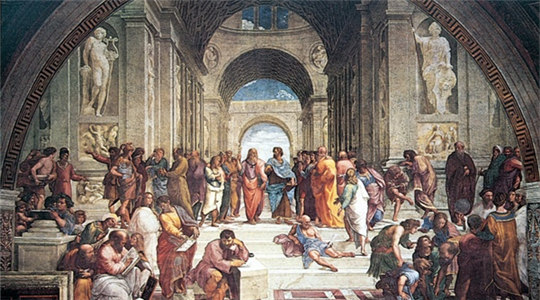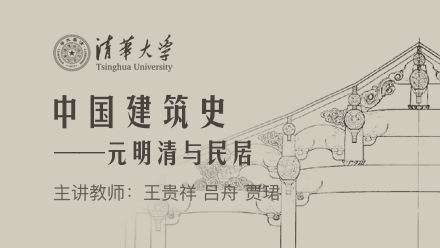
当前课程知识点:Plato, Socrates, and the Birth of Western Philosophy > Seeking “zhen”(真)——Methodology & Logic > 4.Plato’s Dialectics(authentic true) > Plato’s Dialectics(authentic true)
返回《Plato, Socrates, and the Birth of Western Philosophy》慕课在线视频课程列表
返回《Plato, Socrates, and the Birth of Western Philosophy》慕课在线视频列表
下面我给大家讲解
柏拉图的辩证法
同学们以前可能学过
其他一些哲学课程
对辩证法这个哲学概念
应该不会太陌生
辩证法在希腊语中写成
διαλεκτικὴ 这个词
它的基本含义是这么三个方面
一个就是交谈讨论争论
这也是希腊哲学家
在从事哲学活动时候所常用的方法
第二它指的是推理
我们在讲解希腊哲学理性
产生和发展的时候
我们特别指出
巴门尼德开始运用哲学的推理
第三个含义
它就是使用某种语言或者方言
就是说话 因为我们知道
英文里头的那个dialect
这个dialect它有一个意思
就是方言的意思
所以这层意思
是辩证法这个概念的日常含义
柏拉图在它的哲学思考
和哲学创作的过程中间
他创立了他的辩证法理论
阅读柏拉图的著作我们可以看到
他大量地使用这个概念
说辩证法 辩证地 辩证法家
我阅读柏拉图著作的时候
做过一个粗略的统计
出现这些字眼的地方有四五十处
但是由于这个概念的多义性
所以哪怕在同一位哲学家的著作中间
我们仍旧要在具体的语境中间
去辨别柏拉图到底在这里讲的
辩证法辨证论是什么意思
就柏拉图的整个辩证法理论而言
我认为 柏拉图的辩证法
是整个西方哲学史上的
辩证法理论的最早形式
柏拉图的辩证法
他拥有三方面的含义
第一个方面的含义我把它概括为
认识论的含义
为什么这么说呢
我们阅读了柏拉图的一些相关的对话
我们就看到他实际上把辩证法
说成是一种问答的技艺
西方人 希腊人他们谈话的时候啊
他从哲学家产生以后
他们就习惯于问答
柏拉图的辩证法有多方面的含义
他的第一大类含义是认识论的含义
柏拉图他在很多对话中间认为
辩证法是问答的记忆
辩证法是认识理念
或者认识形象的思想进程
柏拉图在很多地方又说
辩证法是纯洁心灵的一门技艺
他在国家篇中间他指出
辩证法是思考学习和教育的方法
它是一切艺术发现之父
看了柏拉图的这些解释
我感到这些解释就是
柏拉图辩证法的认识论含义
柏拉图辩证法还有第二类含义
我把它称作是方法论含义
柏拉图在他著作中间
进行了大量的哲学思考
他在思考许许多多问题的时候
他也在自觉地或不自觉地
在使用各种各样地辩证的方法
到了晚期对话的时候
柏拉图对他自己的哲学探讨
进行反思 而且的话呢
对他自己所使用的这几种方法
做了理论上的总结
所以柏拉图的辩证方法的
第一种方法是辩驳
我们刚才讲
哲学家们在讨论问题的时候
乃至于在进行教学的时候
都大量使用讨论
但是这里讲的辩驳
还和智者们所推崇的那种辩论
有直接的关系
谈话辩论这在古希腊
是有悠久的历史传统
有一位学者曾经这样说
公元前6世纪以后的希腊
修辞学 论辩术日益兴盛
当时的雅典公民
感到自己如果不能说话 不会说话
不能再大庭广众之下表达自己的见解
那就好比上了战场的士兵
忘了带自己的长矛和盾牌
智者在从事他们自己教育活动的时候
确实花了大力气
对语言 对修辞做过很多研究
但是他们在与人交谈的时候
直接地与获胜为目标
所以他们讲述的
他们传授的那些方法啊
基本上就是论战的方法 争论的方法
而柏拉图认为呢
智者这样的方法
他由于目的不正确
所以他们的手段也会不正确
而在哲学中间
要运用讨论的方法
这个他自己就把他总结为辩驳
这个辩驳呢 就相当于
在进行哲学讨论的时候
对于某个已有的观点
要对它进行具体的分析
找出它的问题
提出相反的意见
然后经过这么长期地来回反复
使得在讨论者身上
在讨论者心灵里头产生新的思想
所以柏拉图在晚期对话中间
把这个辩驳啊
为了能够说明哲学家
的辩驳和智者的辩论之间的区别
它就把这个过程称作精神助产术
柏拉图的辩证方法还有第二种
叫做假设法
在巴门尼德篇中间
他概括了这些假设法的基本方法步骤
第一是提出假设 存同去异
第二就是从前提推出结论
对假设进行检验
第三他认为啊 假设的前提
如果不能不证自明的话
那就应该采用回溯的方法
以求能够达到一个不证自明的假设
当然现代逻辑中间的假设法
或者说假设关于假设的理论
和柏拉图当时总结的这个
假设的方法步骤 已经有很大的差别
但我们要知道
能够运用辩证的方法
能够运用假设法
并且对它做理论上的概括总结
这在希腊哲学史上
是由柏拉图首先做的
柏拉图还有第三种辩证的方法
柏拉图把它称作集合与划分
这个集合与划分呐
它大体上是这么一个意思
柏拉图把形象 理念
称作是人们认识的对象
但是这些认识对象呢
又是非常多样的 散乱的
所以柏拉图在运用它的方法的时候
它就指出这个时候
要运用集合的方法
要把各种各样的种
放在一个种的理念之下
然后做一个总括性的总结性的理解
看了柏拉图的对这个集合的解释
我感到它的含义
就大体上相当于我们现在
在谈论方法论的时候的用的那个综合
就是把具体的各种各样的认识对象
你要能够把它综合起来
柏拉图在讲这个集合的时候
它是和划分连在一起的
实际上就是先集合后划分
柏拉图说这个划分
就是根据理念的种属关系
区分这个理念的同异
确定理念的层次和相互关系
这个划分和我们以后
看到的西方哲学认识论方法论
中间的那个分类
看了柏拉图的划分的含义
我们可以知道
他大体上相当于后世哲学方法论里头
讲的那个分类
柏拉图的辩证法
还有它的本体论的含义
因为柏拉图指出
辩证法 是哲学中最高尚
但也是最困难的部分
辩证法研究的对象是真实的存在
或者真实的存在者
作为一个辩证法
他要寻求的不是事物的表象
而是事物的本质
只有辩证法才能认识存在本身
从柏拉图对辩证法的这些解释来看
研究存在 研究本质
研究存在本身
这些问题的研究
我们在哲学史的考察中间
都属于本体论的范围
所以这就是我认为柏拉图的辩证法
也具有本体论的含义的一个理由
柏拉图在他的著作中间
还在很多地方
阐述了辩证法和具体科学的关系
他首先指出辩证法
本身也是一门科学
也是非常非常科学的
但是辩证法呢
又和具体的科学有着本质的区别
他指出数学家音乐家他们也进行研究
他们在某种程度上
也能够认识到某种真实的存在
但是呢 他们所获得的认识
它的真实程度和辩证法
所能达到的程度是不一样的
所以就认识所获得的结果而言
辩证法是一门最理想的科学
而其他科学所获得的结果
都只是一些或然性的意见
所以 在国家篇中柏拉图
用建造一所房屋来比喻辩证法
在整个科学体系中间的位置
他说辩证法是盖顶式
下面我对柏拉图的辩证法
做一个基本的评价
我认为柏拉图的辩证法初步总结了
人类认识的一些基本方法
提出了一些基本原则和步骤程序
他在一定程度上
揭示了这些方法间的联系
这是柏拉图的重要的理论贡献
它不仅直接导致了
亚里士多德的方法论的研究
而且对以后整个西方哲学
产生了重要的影响
-1.Etymology
-2.Definition and the History of Philosophy
--Definition and the History of Philosophy
-3.Religion
--Religion
-4.Culture
--Culture
-5.Theory of Cultural Transformation and Interaction: Five theoretical premise
--Theory of Cultural Transformation and Interaction: Five theoretical premise
-6.Theory of Cultural Transformation and Interaction:Five Basic Position
--Theory of Cultural Transformation and Interaction:Five Basic Position
-7.The Significance of Theory of Cultural Transformation and Interaction
--The Significance of Theory of Cultural Transformation and Interaction
-Self-test Exercises
-Thinking Questions
-1.The Birth Environment of the Greek Philosophy(1)
--The Birth Environment of the Greek Philosophy(1)
-2.The Birth Environment of Greek Philosophy(2)
--The Birth Environment of Greek Philosophy(2)
-3.The Stages and Schools of Greek Philosophy(1)
--The Stages and Schools of Greek Philosophy(1)
-4.The Stages and Schools of Greek Philosophy(2)
--The Stages and Schools of Greek Philosophy(2)
-5.The Local Characteristics of Ancient Greek Philosophy and the progress of internationalization(1)
--The Local Characteristics of Ancient Greek Philosophy and the progress of internationalization(1)
-6.The Local Characteristics of Ancient Greek Philosophy and the progress of internationalization(1)
--The Local Characteristics of Ancient Greek Philosophy and the progress of internationalization(1)
-7.The termination of Ancient Greek Philosophy
--The termination of Ancient Greek Philosophy
-Self-test Excercises
-Thinking Questions
-1.A transition to rational thinking(1)
--A transition to rational thinking(1)
-2.A transition to rational thinking(2)
--A transition to rational thinking(2)
-3.A transition to rational thinking(3)
--A transition to rational thinking(3)
-4.A transition to rational thinking(4)
--A transition to rational thinking(4)
-5.Heraclitus’ thinking
-6.Parmenides’ thinking(1)
-7.Parmenides’ thinking(2)
-Self-test Excercises
-Thinking Questions
-1.Seeking the origin:the early philosophers(1)
--Seeking the origin:the early philosophers(1)
-2.Seeking the origin:the early philosophers(2)
--Seeking the origin:the early philosophers(2)
-3.Seeking the essence: Plato’s theory of Form (1)
--Seeking the essence: Plato’s theory of Form (1)
-4.Seeking the essence: Plato’s theory of Form (2)
--Seeking the essence: Plato’s theory of Form (2)
-5.Seeking to on: Aristotle’s ontology and metaphysics (1)
--Seeking to on: Aristotle’s ontology and metaphysics (1)
-6.Seeking to on: Aristotle’s ontology and metaphysics (2)
--Seeking to on: Aristotle’s ontology and metaphysics (2)
-Self-test Excercises
-Thinking Questions
-1.The lexical meaning
-2.Epistemology(1)
-3.Epistemology(2)
-4.Epistemology(3)
-5.Epistemology(4)
-6.The features
-Self-test Excercises
-Thinking Questions
-1.A lexical meaning(1)
-2.A lexical meaning(2)
-3.A lexical meaning(3)
-4.Plato’s Dialectics(authentic true)
--Plato’s Dialectics(authentic true)
-5.Aristotle’s Logics(judging true)(1)
--Aristotle’s Logics(judging true)(1)
-6.Aristotle’s Logics(judging true)(2)
--Aristotle’s Logics(judging true)(2)
-Self-test Excercises
-Thinking Questions
-1.A lexical meaning
-2.The occurrence and development of the ancient Greek Science(1)
--The occurrence and development of the ancient Greek Science(1)
-3.The occurrence and development of the ancient Greek Science(2)
--The occurrence and development of the ancient Greek Science(2)
-4.The occurrence and development of the ancient Greek Science(3)
--The occurrence and development of the ancient Greek Science(3)
-5.The occurrence and development of the ancient Greek Science(4)
--The occurrence and development of the ancient Greek Science(4)
-6.The occurrence and development of the ancient Greek Science(5)
--The occurrence and development of the ancient Greek Science(5)
-7.the technicalization and application of ancient Greek Science(1)
--the technicalization and application of ancient Greek Science(1)
-8.the technicalization and application of ancient Greek Science(2)
--the technicalization and application of ancient Greek Science(2)
-Self-test Excercises
-Thinking Questions
-1.A Lexical meaning
-2.Plato’s theory of Love
-3.The high praise to the love god: a reading on Symposium (1)
--The high praise to the love god: a reading on Symposium (1)
-4.The high praise to the love god: a reading on Symposium (2)
--The high praise to the love god: a reading on Symposium (2)
-5.The high praise to the love god: a reading on Symposium (3)
--The high praise to the love god: a reading on Symposium (3)
-6.The high praise to the love god: a reading on Symposium (4)
--The high praise to the love god: a reading on Symposium (4)
-Self-test Excercises
-Thinking Questions
-1.A lexical analysis
-2.The development of the Classic Greek Ethics(1)
--The development of the Classic Greek Ethics(1)
-3.The development of the Classic Greek Ethics(2)
--The development of the Classic Greek Ethics(2)
-4.The development of the Classic Greek Ethics(3)
--The development of the Classic Greek Ethics(3)
-5.The development of the Classic Greek Ethics(4)
--The development of the Classic Greek Ethics(4)
-6.From the ultimate goodness to the common goodness(1)
--VideoFrom the ultimate goodness to the common goodness(1)
-7.From the ultimate goodness to the common goodness(2)
--From the ultimate goodness to the common goodness(2)
-Self-test Excercises
-Thinking Questions
-1.A lexical meaning
-2.Ancient humanistic trend of thoughts(1)
--Ancient humanistic trend of thoughts(1)
-3.Ancient humanistic trend of thoughts(2)
--Ancient humanistic trend of thoughts(2)
-4.Ancient humanistic trend of thoughts(3)
--Ancient humanistic trend of thoughts(3)
-5.A theoretical summary
-Self-test Excercises
-Thinking Questions
-1.A lexical analysis
-2.The story of Gyges
-3.The Ancient theory of justice(1)
--The Ancient theory of justice(1)
-4.The Ancient theory of justice(2)
--The Ancient theory of justice(2)
-4.The Ancient theory of justice(3)
--The Ancient theory of justice(3)
-Self-test Excercises
-Thinking Questions
-1.An explanation to the related words
--An explanation to the related words
-2.A Platonic Republic
-3.Cicero’s people’s Republic(1)
--Cicero’s people’s Republic(1)
-4.Cicero’s people’s Republic(2)
--Cicero’s people’s Republic(2)
-Self-test Excercises
-Thinking Questions
-1.A lexical analysis
-2.The religious trends in the late period of ancient Greek philosophy(1)
--The religious trends in the late period of ancient Greek philosophy(1)
-3.The religious trends in the late period of ancient Greek philosophy(2)
--The religious trends in the late period of ancient Greek philosophy(2)
-4.The religious trends in the late period of ancient Greek philosophy(3)
--The religious trends in the late period of ancient Greek philosophy(3)
-5.The religious trends in the late period of ancient Greek philosophy(4)
--The religious trends in the late period of ancient Greek philosophy(4)
-6.The collision between faith and reason(1)
--The collision between faith and reason(1)
-7.The collision between faith and reason(2)
--The collision between faith and reason(2)
-Self-test Excercises
-Thinking Questions
-1.An explanation to the related words
--An explanation to the related words
-2.Communion with gods(1)
-3.Communion with gods(2)
-4.Communion with gods(3)
-5.Communion with gods(4)
-6.Plotinus’ mystical system of thoughts
--Plotinus’ mystical system of thoughts
-Self-test Excercises
-Thinking Questions
-1.The local characteristics of the ancient Greek Philosophy
--The local characteristics of the ancient Greek Philosophy
-2.The progressive universalization of the ancient Greek Philosophy
--The progressive universalization of the ancient Greek Philosophy
-3.The basic spirits of the ancient Greek Philosophy(1)
--The basic spirits of the ancient Greek Philosophy(1)
-4.The basic spirits of the ancient Greek Philosophy(2)
--The basic spirits of the ancient Greek Philosophy(2)
-Self-test Excercises
-Thinking Questions



